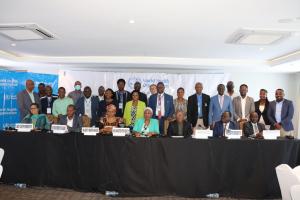WHO and Partners revamp war against cholera in Africa
Dar es Salaam: The World Health Organization in the African region is embarking on a continent-wide effort to eliminate Cholera in the Region. This commitment is in line with “the Ending cholera: A global roadmap to 2030” strategy, that seeks to reduce cholera deaths by 90% and eliminate the disease transmission in 20 countries.
In 2018, African Member States adopted the Regional Framework for the Implementation of the Global Strategy for Cholera Prevention and Control, 2018 – 2030. This framework defines clear milestones for cholera elimination in the Region. However, only 5 Member States (DRC, Ethiopia, Kenya, Zambia, and Zimbabwe) have validated long-term cholera elimination plans in 2021; and at least 10 Member States are affected by cholera outbreaks each year in the AFRO Region. Tanzania experienced its longest cholera outbreak which started in 2015 to 2019.
Cholera remains one of the major public health emergencies in the Region. From 2014 to 2021, the Region accounted for 21% of cholera cases and 80% of deaths reported globally. In 2021, the Region experienced its ever-reported high burden cholera outbreaks with more than 137,000 cases and 4,062 deaths reported from 19 Countries.
The response to these outbreaks had faced challenges including inadequate participation from other key sectors, limited resource and delay in declaration and notification as required by international health regulations (IHR 2005). In 2022, the United Republic of Tanzania has been affected by cholera outbreaks in Katavi, Kigoma and Rukwa regions.
One of the major leading factors to the burden of cholera in the Region is the insufficient preparedness as revealed by a recent readiness assessment conducted in 23 countries.
To improve this situation, the World Health Organization African Region is organizing a targeted training in 28 priority countries to get them on track to cholera elimination targets.
“This training is a regional effort to increase and strengthen the readiness in high-risk cholera countries to quickly and effectively detect and respond to cholera, this inequity disease that can be easily prevented,” said WHO Tanzania Acting Representative, Dr. Zabulon Yoti.
The workshop in Dar es Salaam is the fifth of the series of six trainings and will involve technical officers from ministries responsible for health and water from Angola, Malawi, Mozambique, United Republic of Tanzania and Zambia. This training will be facilitated by the three levels of WHO and experts from UNICEF, MSF, partners’ platform, International Federation of Red Cross, Secretariat of the Global Task Force on Cholera Control, the Country Support Platform and Center of Disease Control.
During her opening remarks, Mrs. Shalini Bahuguna, the UNICEF Representative in the United Republic of Tanzania highlighted the importance of the multisectoral collaboration, community engagement; and access to safe water and adequate sanitation in preventing and managing cholera outbreaks.
After their orientation, the participants will conduct trainings and simulation exercises on cholera in major hotspots in their respective countries. This will improve capacities at local levels for adequate prevention, early detection and timely response to cholera.
“It is unacceptable that Africa continues to register more than 80% of cholera deaths reported globally. There is urgent need to improve surveillance system to enable early detection of cases as well as to improve case management and ensure the availability of oral rehydration salt in all settings”, said Ummy Mwalimu, the honorable Minister of Health of the United Republic of Tanzania.
This regional workshop that will include practical sessions will end on 2nd September 2022.







